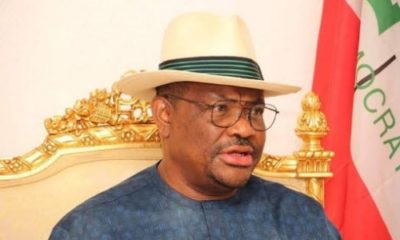NEWS
JUST IN: Diezani Alison-Madueke To Appear In UK Court On Bribery, Fraud Charges

Diezani Alison-Madueke a former Nigeria Minister has been accused of bribery following an investigation by the National Crime Agency.
She held a prominent role in the Nigerian government from 2010 to 2015, including serving as president of OPEC.
The NCA believes she received bribes while serving as Minister for Petroleum Resources, in exchange for granting lucrative oil and gas contracts.
Allegedly, she enjoyed various benefits such as cash, chauffeured cars, private jet flights, luxurious family vacations, and the use of multiple properties in London.
Further details of the charges against her include additional benefits like furniture, renovations, property staff, private school fees, and lavish gifts from upscale stores such as Cartier and Louis Vuitton.
Currently residing in London’s St John’s Wood, she is scheduled to attend Westminster Magistrates Court on 2 October.
Andy Kelly, the leader of the NCA’s International Corruption Unit, has voiced suspicions that Alison-Madueke misused her authority in Nigeria and profited financially by granting multi-million pound contracts.
He said “We suspect Diezani Alison-Madueke abused her power in Nigeria and accepted financial rewards for awarding multi-million pound contracts.
“These charges are a milestone in what has been a thorough and complex international investigation.
“Bribery is a pervasive form of corruption, which enables serious criminality and can have devastating consequences for developing countries. We will continue to work with partners here and overseas to tackle the threat.”
Assets valued in the millions of pounds, associated with the purported offenses, have been frozen as an aspect of the ongoing inquiry.
In March of this year, the NCA supplied evidence to the US Department of Justice, resulting in the recovery of assets amounting to USD$53.1 million, which were connected to the alleged corruption of Diezani Alison-Madueke.
The ICU team has collaborated closely with the Economic and Financial Crimes Commission of Nigeria throughout the investigation, in addition to working alongside the NCA’s International Anti-Corruption Coordination Centre.
The International Anti-Corruption Coordination Centre (IACCC) assembles expert anti-corruption investigators from global agencies to address corruption claims involving politically influential individuals. Presently, it is active in 37 diverse jurisdictions.
Andrew Penhale, Chief Crown Prosecutor for the CPS, commented: “The Crown Prosecution Service has authorised the NCA to charge Diezani Alison-Madueke with bribery offences.
“The CPS made the decision to authorise the charge after reviewing a file of evidence from the NCA relating to allegations of bribery in Nigeria.
“Criminal proceedings against Ms Alison-Madueke are active and she has the right to a fair trial.
“It is extremely important that there should be no reporting, commentary or sharing of information which could in any way prejudice these proceedings.
“The function of the CPS is not to decide whether a person is guilty of a criminal offence, but to make fair, independent and objective assessments about whether it is appropriate to present charges for a criminal court to consider.” he added.
NEWS
BREAKING: Lagos To Clear 100 Shanties Under Adeniji Adele Bridge
The Lagos State Government has announced a significant initiative aimed at removing more than 100 shanties located beneath the Adeniji Adele bridge.
Scheduled to commence on Monday, May 6, 2024, this operation was disclosed by Mr. Tokunbo Wahab, the State Commissioner for the Environment and Water Resources, during an exclusive interview with news outlets on Sunday.
He said “The Lagos State Government will undertake enforcement action to remove over 100 shanties at Adeniji Adele underbridge from tomorrow, Monday, 6th of May, 2024.
“The removal is coming after the expiration of a 48-hour removal notice served on all occupants of the shanties to move with their belongings.”
He revealed that the upcoming shanty clearance operation beneath the Adeniji Adele bridge will be supported by operatives from the Kick Against Indiscipline and officials from the Monitoring Enforcement and Compliance department of the ministry.
This move, according to him is aimed at reclaiming ungoverned spaces across Lagos, underscores the state government’s unwavering commitment to urban management and public safety.
He said “Apart from the unsanitary conditions of residents in the shanties, it also serves as a hiding place for criminals and points for peddling hard drugs and substances which is injurious to the wellbeing of law-abiding residents.
Following a similar operation in Ikoyi last week, the Lagos State Ministry of Environment and Water Resources has cleared illegal structures, including an apartment rented for N250,000 annually, found under the Dolphin Estate Bridge.
Commissioner for Information, Gbenga Omotosho, announced on Sunday that out of 450 squatters arrested, 371 requested relocation to their home states.
NEWS
How NERC’s New Commercial Billing Threatens Healthcare, Economy

The crippling impact of the newly introduced electricity billing, which classifies locations and businesses into two buckets of Band A or Band B has been decried.
President, Save-A-Life Foundation, Dr Richard Okoye, has expressed grave concerns about the scary electricity bill served on his hospital in Rivers State by the Port Harcourt Electricity Distribution (PHED).
His outcry was contained in a video clip which went viral on Thursday,
Following the new billing classification, which put his hospital in Band A, Dr Okoye was aggrieved that his monthly bill jumped to N25,300,000, which he noted would have devastating effects on the healthcare sector in Nigeria, as well as other businesses.
Dr Okoye is not the only person speaking up against the excessive hike in electricity bills.
President, the Trade Union Congress (TUC), Festus Osifo, had made a similar call during the May Day Rally in Abuja, where he strongly urged the Nigerian Electricity Regulatory Commission (NERC) to reverse the tariff hike within a week.
Osifo maintained that keeping the current billing levels would have severe impact on Nigeria’s economic growth, thus stressing the urgency of effective energy management to prevent further setbacks.
He maintained that the “glaring incompetence in managing this sector for the collective welfare of our citizens,” is a major factor constraining Nigeria’s economy.
The labour leader asserted that, “It is unethical to force Nigerians to pay higher tariffs for non-existent electricity. Estimated billing is an extortion and a daylight robbery against Nigerians.
Recall that the NERC on April 3, 2024 approved a significant increase in electricity tariffs for customers falling under the Band A classification.
Vice Chairman. NERC, Musliu Oseni, declared that the adjustment would raise the rate from the current N66 per kilowatt-hour to N225 per kilowatt-hour.
Though the billing reviews introduced by the NERC had attracted wide condemnation from Nigerians, the government had opted to stand behind the Commission.
For the government, the over 300 percent upward review was a take-it or leave-it for electricity consumers.
Nigeria’s Minister of Power, Adebayo Adelabu, who defended the scandalous review before the Senate pointed to the cost of infrastructure required to keep the sector running.
In his opinion, the only way to make the sector attractive to investors was to get the consumers to bear the cost of building and maintaining the infrastructure, which would also make the sector bankable.
Adelabu said, “For this sector to be revived, government need to spend nothing less than 10 billion dollars annually in the next 10 years.
“This is because of the infrastructure requirement for the stability of the sector. But government cannot afford that. And so we must make this sector attractive to investors and to lenders.
“So for us to attract investors and investment, we must make the sector attractive, and the only way it can be made attractive is that there must be commercial pricing.”
However, Dr Okoye’s position, which Netizens applaud, is that the government’s decision to jerk up Band A’s tariff, would be an epidemic against the healthcare sector and other busiensses.
He described moving from paying N66 per kilowatt to N225 per kilowatt as a ‘Band A tariff epidemic”, capable of destroying the healthcare system of Nigeria.
Dr Okoye said, “By reason of us (the hospital) being in Band A, our monthly power bill is now shooting up to N25,300,000. That’s crazy; the hospitals are not business centres but only renders essential services to society.
“This Band A tariff epidemic is bound to destroy the country’s healthcare system.
“We are already struggling with an influx of doctors leaving the country. The majority of the healthcare system is struggling, as it were. If nothing is done to urgently revisit that decision, the Band A tariff epidemics will turn most hospitals into morgues. Something that could be preventable.
“Power (electricity) is the life of the healthcare delivery. Patients have hope and a sense of living again when the light is in the hospital. In addition to that, the majority of emergency drugs and anaesthetic drugs always want to be at a particular temperature which can be sustained by electricity. If this decision persists, it will come to a point where most of the drug will be in an unusable state, and it is already happening.”
Narrating his experience during a medical engagement to elaborate on the need for a hospital to be on steady power supply, Dr Okoye pointed out that an elderly woman who was supposed to be operated upon was given the requisite volume of propofol needed for her to relax but could not sleep because the potency of the drug has reduced due to poor storage, occasioned by inadequate power supply.
“We were surprised and thought the woman was alcoholic, and the anaesthetic increased the dose a little and asked again, only for the woman to confirm that she was fine again.
“After evaluation, it was discovered that though the drug was original but not well preserved, it would lose potency.
“That is to say, those who are diabetic in Nigeria should brace up because the majority of them would see no way to buy their drugs.
“In fact, they need to travel miles to get a hospital with a steady light to get drugs they are taking.
“While this Band A is on, teaching hospitals and Federal Medical Centres which used to enjoy some relative form of light because perhaps they would not be billed like other people. They are now downgrading them to Band B and channelling Band A to those they feel can pay to the detriment of the people.
“I can count on and on. Power (supply) is what determines whether a surgical procession would be successful or not. It determines the ‘before and after’ outcome of any surgery.”
“If the instruments are not properly sterilised, they may be the ones resistant to all antibiotics known, that even when we start getting it right, the worst has already happened,” Dr Okoye pointed out.
According to him, the Nigerian government must act fast in this regard to avoid it having a severe impact on the hospitals, the healthcare system, the health of Nigerians, and businesses generally.
“My heart melts when a teaching hospital can pack its instruments to go and sterilise in another hospital because it doesn’t have light. The FG should act because it is preventable as it is now,” he stressed.
It would appear thought that the government might not have the final say on this, as a Federal High Court in Kano had already issued restraining orders on the NERC and the Kano Electricity Distribution Company (KEDC).
The court ordered the parties to refrain from implementing the new electricity tariff for Band A consumers.
NEWS
Kwara-based Catholic School Shines In 2024 UTME: 30 Students Score Above 300
The Eucharistic Heart of Jesus Model College, Ilorin, Kwara State, has made headlines with a remarkable achievement in the 2024 Unified Tertiary Matriculation Examination (UTME).
Revealed by Reverend Father Jude Okeh via his X handle, @friajudeo, the school proudly announced that 30 of its students scored impressively between 300 and 355 points.
Topping the list are Fasesin Ayomiposi and Kunle-Olawepo Ayomikun, both securing an outstanding 355 points.
Following closely are Adelodun Oluwadarasimi and Ayejuto Daniel with 341 points, and Idris Jamaaldeen with 333 points, showcasing the school’s commitment to academic excellence.
The UTME results have garnered attention amidst recent controversies surrounding the exam. With over 8,000 students nationwide achieving scores above 300, the proficiency demonstrated by these students from Eucharistic Heart of Jesus Model College stands as a testament to their dedication and the quality of education provided by the institution.
In a statement, Reverend Father Jude Okeh highlighted the significance of this achievement, particularly in light of the challenges faced by candidates nationwide.
Netizens have lauded the students’ success, acknowledging it as a remarkable feat amidst the backdrop of JAMB’s statistics, which revealed a significant number of candidates failing to meet the 200 marks threshold.
JAMB reiterated the purpose of the UTME as a ranking examination and cautioned against the proliferation of fake result slips.
The board emphasized the importance of relying on official channels for result verification, reaffirming its commitment to maintaining the integrity of the examination process.
The stellar performance of the students from Eucharistic Heart of Jesus Model College serves as a beacon of inspiration, reflecting the potential for excellence within the educational landscape of Kwara State and beyond.



















